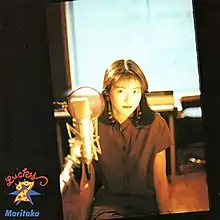| Lucky 7 | ||||
|---|---|---|---|---|
 | ||||
| Studio album by | ||||
| Released | May 10, 1993 | |||
| Recorded | 1992–1993 | |||
| Genre | ||||
| Length | 60:02 | |||
| Language | Japanese | |||
| Label | Warner Music Japan | |||
| Producer | Yukio Seto | |||
| Chisato Moritaka chronology | ||||
| ||||
| Singles from Lucky 7 | ||||
| ||||
| Alternative cover | ||||
 Limited edition inner cover | ||||
Lucky 7 (ラッキーセブン, Rakkī Sebun) is the eighth studio album by Japanese singer/songwriter Chisato Moritaka, released on May 10, 1993. It was Moritaka's final studio release under Warner Music Japan. The album's title signifies the seventh anniversary of Moritaka's debut. A limited edition release included a 32-page photo book.[1][2]
The album reached No. 3 on Oricon's albums chart and sold over 421,000 copies.[3][4] It was also certified Platinum by the RIAJ.[5]
Track listing
All lyrics are written by Chisato Moritaka
| No. | Title | Music | Arrangement | Length |
|---|---|---|---|---|
| 1. | "Te wo Tatakō" ((手をたたこう, "Clap Your Hands")) | Moritaka | Moritaka | 3:26 |
| 2. | "Tanki wa Sonki" ((短気は損気, "Irritability")) | Yuichi Takahashi | Takahashi | 2:50 |
| 3. | "Hareta Nichiyōbi" ((晴れた日曜日, "Sunny Sunday")) | Takahashi | Takahashi | 4:37 |
| 4. | "Jimi na Onna" ((地味な女, "A Sober Woman")) | Hideo Saitō | Saitō | 4:27 |
| 5. | "Tōi Mukashi" ((遠い昔, "A Long Time Ago")) | Takahashi | Takahashi | 3:54 |
| 6. | "Bassari Yatte yo" ((ばっさりやってよ, "Just Do It")) | Takahashi | Takahashi | 3:44 |
| 7. | "Watashi no Natsu (Album Version)" ((私の夏, "My Summer")) | Saitō | Saitō | 5:33 |
| 8. | "I Love You" | Hiromasa Ijichi | Takahashi | 3:52 |
| 9. | "Hae Otoko" ((ハエ男, "Fly Man")) | Moritaka | Moritaka | 4:02 |
| 10. | "Watarasebashi" ((渡良瀬橋, "Watarase Bridge")) | Saitō | Saitō | 3:47 |
| 11. | "Sayonara Watashi no Koi" ((さよなら私の恋, "Goodbye, My Love")) | Saitō | Saitō | 4:33 |
| 12. | "Tomodachi no Kare" ((友達の彼, "His Friend")) | Ijichi | Takahashi | 4:52 |
| 13. | "Otoko no Roman" ((男のロマン, "A Man's Romance")) | Saitō | Saitō | 4:49 |
| 14. | "Memories" | Saitō | Saitō | 5:33 |
| Total length: | 60:02 | |||
Personnel
- Chisato Moritaka – vocals, drums, piano, rhythm guitar, alto recorder
- Yuichi Takahashi – guitar, bass, synthesizer, backing vocals (all tracks except where indicated)
- Hideo Saitō – guitar, bass, organ, synthesizer, tambourine (4, 7, 10, 11, 13, 14)
- Eiji Ogata – guitar (9)
- Jun Takahashi – acoustic guitar (11)
- Shin Hashimoto – piano (9)
- Yukio Seto – bass (all tracks except where indicated), guitar, (3, 12)
Charts
| Chart (1993) | Peak position |
|---|---|
| Japanese Albums (Oricon)[3] | 3 |
Certification
| Region | Certification | Certified units/sales |
|---|---|---|
| Japan (RIAJ)[5] | Platinum | 400,000^ |
|
^ Shipments figures based on certification alone. | ||
References
- ↑ "LUCKY7". Kioku no Kiroku. The Federation of Music Publishers Japan. Retrieved 2020-04-03.
- ↑ "森高千里". Idol.ne.jp. 29 December 2018. Retrieved 2020-04-03.
- 1 2 "Lucky 7/森高千里". Oricon. Retrieved 2020-04-03.
- ↑ "森高千里". Yamachan Land. Archived from the original on 2011-08-14. Retrieved 2021-06-23.
- 1 2 "Japanese certifications – 森高 千里 – LUCKY 7" (in Japanese). Recording Industry Association of Japan. Retrieved March 24, 2021. Select 1993年6月 on the drop-down menu
External links
- Official website (Chisato Moritaka)
- Official website (Up-Front Works)
- Lucky 7 at MusicBrainz
- Lucky 7 at Discogs
This article is issued from Wikipedia. The text is licensed under Creative Commons - Attribution - Sharealike. Additional terms may apply for the media files.